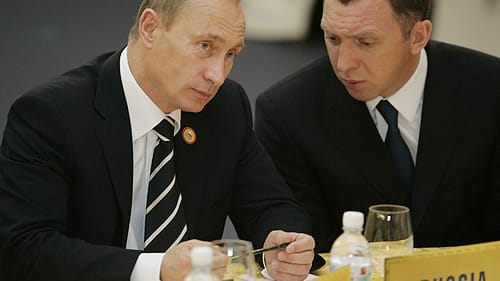Stay in the Loop
BSR publishes on a weekly schedule, with an email newsletter every Wednesday and Thursday morning. There’s no paywall, and subscribing is always free.
The method to his madness
Understanding Trump (once again)

Are you puzzled by the latest barrage of loopy behavior from the Trump White House? Then you’ve come to the right place. As I’ve suggested before in this space, for every seeming inconsistency in Donald Trump’s actions, there’s a consistent (I didn’t say rational) explanation.
Consider three recent examples:
- First, defying his advisors, Trump announced plans to impose hefty tariffs on imported steel and aluminum. When virtually every economist on the planet — including Trump’s chief economic advisor, Gary Cohn, who resigned in protest — objected that that the tariffs would trigger a retaliatory trade war that could cost the global economy (including U.S. consumers) $470 billion, Trump tweeted, “Trade wars are good and easy to win.”
- Second, shocking the world — not to mention his State Department and America’s allies, who weren’t consulted — Trump agreed to meet with North Korea’s dictator Kim Jong Un, thus legitimizing a tyrant whom Trump had taunted since last September as “Little Rocket Man” and whose country Trump threatened last August to destroy with “fire and fury like the world has never seen.” Previous U.S. presidents had declined such a summit, which the Pyongyang government has long coveted, unless the North Koreans made major concessions. But Trump reportedly accepted the offer on the spot last week without any preconditions (at least initially), taking his own administration by surprise.
These bold, impulsive, and cockamamie actions should come as no surprise to faithful readers of this column. Both confirm a prediction I made in September 2017:
“In any given situation, Trump will take the action that makes waves or creates headlines, even if it makes no moral, political, or practical sense. How else to explain his withdrawal from the Paris Climate Accord, his decision to exclude transgender citizens from the military, his singular refusal to condemn white racists in Charlottesville, and his current attempt to deport 800,000 children of undocumented immigrants? From a narcissist’s perspective, how can you attract attention if you simply endorse conventional wisdom?”
Legendary penny pincher
- Third, to cover up Trump’s 2006 extramarital affair with a pornographic film actress known as Stormy Daniels, Trump’s lawyer Michael Cohen paid her $130,000 in hush money just before the 2016 presidential election, the Wall Street Journal reported. Cohen subsequently acknowledged the payment but insisted he paid the money out of his own pocket on Trump’s behalf and implied Trump had nothing to do with the transaction. When it was pointed out that such behavior is (a) unethical according to the New York State court system's Rules of Professional Conduct, which require lawyers to confer with their clients, and (b) probably illegal (as an unreported contribution to Trump’s campaign), Cohen backtracked and claimed he put up the money as a loan to Trump in order to finalize the agreement, because he was unable to reach Trump before Election Day.
This narrative too will come as no surprise to anyone who has conducted business with Trump. Among his contractors, lenders, and employees, the man’s stinginess is legendary.
A Philadelphia lawyer tells me he was once retained by Trump to perform miscellaneous legal chores for Trump’s Atlantic City casino at a monthly retainer of $5,000. After six months, the lawyer inquired when he would be paid. Trump referred him to the casino and then to the Atlantic City Casino Reinvestment Development Authority, both of which referred him back to Trump. This dance continued for a year; the lawyer says he never received a cent.
The consistent thread here is Trump’s reluctance to spend money — either because he isn’t as rich as he claims, because his ego demands that others donate their services to him as a form of tribute, or because he imagines that people are taking advantage of him.

The Manafort connection
The recent revelations about Paul Manafort, Trump’s indicted former campaign manager, suggest how Trump’s miserliness got him entangled with such a shady character. When Manafort’s pro-Russian client Viktor Yanukovych was driven from Ukraine’s presidency in 2014, Manafort’s income evaporated. He found himself millions of dollars in debt for expensive homes he had purchased years earlier in New York City and the Hamptons.
Manafort's prime creditor appears to be Russian oligarch Oleg Deripaska, who in 2014 filed a petition in the Cayman Islands claiming that Manafort and his longtime partner Rick Gates couldn’t account for almost $19 million a company controlled by Deripaska had given them to invest. Deripaska, who is said to be close to Russian president Vladimir Putin, was denied entry to the United States because of his suspected ties to organized crime: lucky news for Manafort's kneecaps.
Amid this desperate situation, in March 2016 Manafort offered free consulting services to Trump’s presidential campaign and Trump accepted. Manafort’s apparent strategy was to use his role in the campaign to placate Deripaska. In April 2016 Manafort emailed a Deripaska aide about the new job. In May, Manafort was promoted to Trump campaign chairman — a paid position — with Gates as his deputy. In July, Manafort offered to give Deripaska private briefings about the campaign. But in August, after the New York Times and Associated Press separately reported investigations of Manafort’s Russian connections, he resigned from Trump’s campaign.
Last October, Manafort and Gates were indicted for money laundering and conspiracy against the United States. Gates pleaded guilty and is cooperating with special counsel Robert Mueller’s investigation.
(For the full background, click here.)
Trump might have had nothing to do with Manafort's Russian shenanigans. But why, you ask, would Trump have welcomed such a dubious character into his inner circle? The key factor, I suggest, was Manafort’s willingness to work for nothing.
Trusted intimates
Michael Cohen has lately complained that Trump never reimbursed him for paying off Stormy Daniels and is said to have told friends he still expects Trump to make him whole again. I wish him good luck with that. Such a reimbursement would involve a layout of cash Trump likely cannot afford and an admission of guilt that Trump’s ego cannot stomach. Cohen is more likely to be reimbursed by Stormy Daniels (who has offered to refund the payment) than by the Donald.
During the 2016 election campaign, Garry Wills argued in the New York Review of Books that the circle of Trump’s trusted intimates is “severely constricted — to those he can use or want to use him.” As Michael Cohen discovered, it’s usually more of the former than the latter. But say this much for Trump: he is consistent.
Sign up for our newsletter
All of the week's new articles, all in one place. Sign up for the free weekly BSR newsletters, and don't miss a conversation.

 Dan Rottenberg
Dan Rottenberg